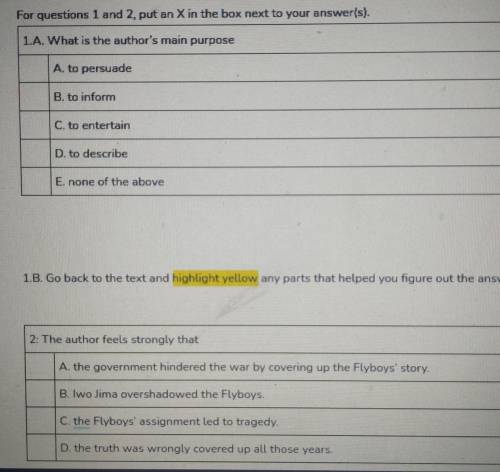
English, 22.03.2021 14:00 mazolethrin6876
As a lawyer, Bill had spent his professional life ferreting out documents. He made some inquiries and dedicated eleven months to following where they led. Then one day, a boxed transcript arrived in the mail from Washington. The transcript contained the full proceedings of a trial establishing the fates of eight American airmen, Flyboys downed in water in the vicinity of Iwo Jima during World War II. Each was shot down during bombing runs against Chichi Jima, the next island north of Iwo Jima. Iwo Jima was coveted for its airstrips, Chichi Jima for its communications stations. Powerful short- and long wave receivers and transmitters atop Chichi's Mount Yoake and Mount Asahi were the critical communications links between Imperial Headquarters in Tokyo and Japanese troops in the Pacific. The radio stations had to be destroyed, the US military decided, and the Flyboys had been charged with doing so. A stack of papers my brother found in my dad's office closet after his death in 1994 had launched me on a quest to find my father's past. Now, on Bill's table, I was looking at the stack of papers that would become the first step in another journey. On the same day my father and his buddies raised that flag on Iwo lima, Flyboys were held prisoner just 150 miles away in Chichi Jima. But while everyone knows the famous Iwo Jima photo, no one knew the story of these eight Chichi Jima Flyboys. Nobody knew for a reason. For over two generations, the truth about their demise was kept secret. The US government decided the facts were so horrible that the families were never told. Over the decades, relatives of the airmen wrote letters and even traveled to Washington DC in search of the truth. Well-meaning bureaucrats turned them away with vague cover stories "All these years I had this nagging feeling these guys wanted their story told Bill said. Eight mothers had gone to their graves not knowing the fates of their lost sons. Sitting at Bill's table, I suddenly realized that now I know what the Flyboys mothers had never learned. I will be offering twice less the amount of points for this question. Please do not spam letters for points or you will be reported.


Answers: 2


Another question on English

English, 21.06.2019 23:00
Read this excerpt from "the light of gandhi's lamp" by hilary kromberg inglis, in which she describes driving to the police station where her sister is being detained. to avoid looking at the blackened windows at the top of the building and thinking about the history of who had died or been tortured there, i always looked instead at the little chinese restaurant on the opposite side of the road. how does this passage affect the text? it conveys, with great subtlety, the conflict she felt over having a sister who would break the law and end up in the custody of the police. it conveys, without any implied moral judgment, that those who fought against apartheid considered themselves to be soldiers in a just war. it conveys, with an extended metaphor, the idea that being detained by the police in this society was regarded as a badge of honor. it conveys, with direct language, the view held by many anti-apartheid activists that the police often acted in brutal and unlawful ways.
Answers: 2

English, 22.06.2019 04:20
Define the followings summary main idea paragraph i need a answers right now
Answers: 1

English, 22.06.2019 08:00
Why didn't van gogh knock on breton's door? it seemed imposing and a bit scary. it looked alarmingly middle-class. he couldn't find the door. he saw a book that he liked instead.
Answers: 1

You know the right answer?
As a lawyer, Bill had spent his professional life ferreting out documents. He made some inquiries an...
Questions


Biology, 25.03.2020 16:58



Mathematics, 25.03.2020 16:58

Mathematics, 25.03.2020 16:58







Mathematics, 25.03.2020 16:58

Mathematics, 25.03.2020 16:58

Mathematics, 25.03.2020 16:58



History, 25.03.2020 16:59




